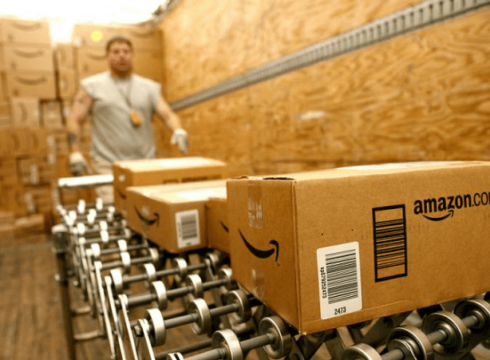Inc42 Daily Brief
Stay Ahead With Daily News & Analysis on India’s Tech & Startup Economy
While Amazon is pushing hard to lead the ecommerce game in India, it appears that the tax department authorities are not in favor to “go easy” on it. As reports suggests that the Karnataka state’s tax department has issued notices to over 40 sellers which works with Amazon, thereby restricting these sellers to do business with Amazon.
Last month there were reports that the karnataka’s tax department has barred Amazon India from selling products from its warehouse in the state by cancelling the licences of more than 100 third-party merchants that work with the local unit of the company.
Later, even chief minister Siddaramaiah, asked the tax department to “go easy” on Amazon’s sellers and had also directed the commercial taxes department to study laws and issues related to e-commerce and recommend necessary changes.
But however, tax department has sent notices to over 40 sellers that work with Amazon in the past 15 days. These notices points out that these merchants cannot register Amazon’s warehouse as their “additional place of business”.
The Karnataka tax department is working to amend tax regulations to address the ecommerce, as of now there are no specific mention in the tax laws of Karnataka or other states because these laws predate online retail.
The problem arose when the Government asked Amazon to pay up VAT for all the seller merchandise that is stored in its warehouse and is sold through its Fulfilment by Amazon (FBA) service. (VAT is a State tax that is charged on the sale of goods and is treated or interpreted differently in different States.)
The issue in Karnataka revolves around the fact that Amazon stores certain products owned by third-party merchants at its warehouse even before a customer has ordered them, this service is called ‘Fulfilment’ by Amazon. Whereas as in other cases, Amazon just simply picks up products from merchants after a customer has placed an order on its site. But in larger cases Amazon encourages its merchants to store their goods at its warehouses so that it can deliver them much faster when orders are actually placed.
Once the order is delivered to the customers, Amazon keeps a cut and gives the remaining proceeds to its merchants who then pay VAT to the state government. But tax department in the state has asked Amazon to pay the tax rather than the company’s merchants, for the orders it gets under the “Fulfilment by Amazon” service.
But as Amazon, on its part, is just providing a service for third party sellers to sell their merchandise conveniently and quickly and is not liable to pay VAT as it does not own the merchandise.
“As per the Karnataka VAT laws, they (Amazon) are acting as commission agents, and hence should discharge their liabilities to the government under the fulfilment model. We have no issues with regard to the marketplace model,” said Ajay Seth, commissioner of commercial taxes.
Value-added tax (VAT) or sales tax is a state subject and hence laws differ from state to state. And thus, Amazon has not faced tax issues in other States where it owns warehouses or fulfilment centres.
Related: Is Indian Grandfathered Tax Laws A Roadblock For Ecommerce In India?
According to people close to the development, the tax department is yet to send its final recommendations to the government about this issue, the people said. “The recommendations may make it clear that marketplaces will have to bear tax liability under the ‘fulfilment’ model. However, the department is still considering the recommendations and hasn’t taken a final call yet,”
Even various other ecommerce firms have been urging the government not to impose VAT on ecommerce trade. Reports states that some of the merchants that were served notices in July and August also work with Flipkart and Snapdeal. But as Amazon owns a warehouse in Bangalore, thus the move by the Karnataka tax department has primarily affected it. Whereas, Flipkart which also owns a warehouse in state has not been served with any such notice.
Amazon has six fully operational warehouses in Mumbai, Delhi, Chennai, Jaipur, Ahmedabad and Tauru (Haryana) apart from Bangalore.
Amazon India is working hard to resolve the issue with state tax authorities, but in case they fail to reach a consensus, the company could be forced to shut its warehouse in Bangalore.
Note: We at Inc42 take our ethics very seriously. More information about it can be found here.


